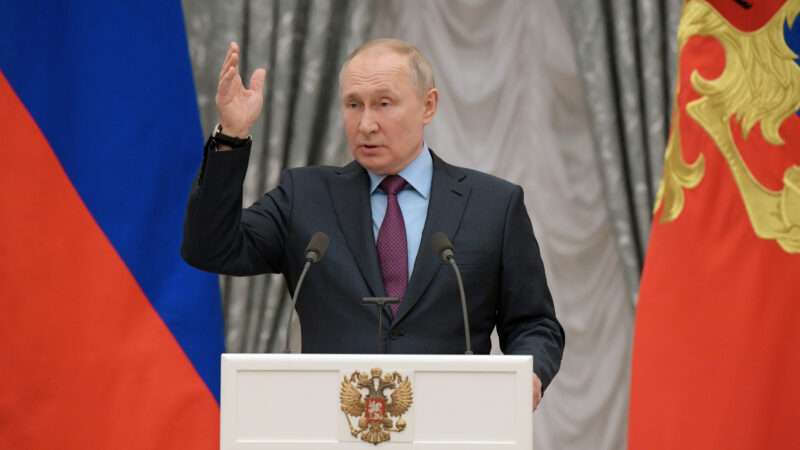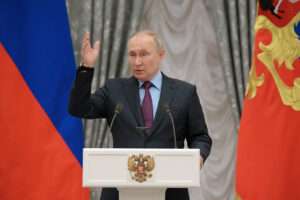

President Biden is among the many Western leaders who have denounced Vladimir Putin as a war criminal because of the atrocities Russian forces have committed in their war of aggression against Ukraine. There is good reason for that condemnation. Putin and other Russian leaders are clearly guilty of horrific war crimes, on a massive scale. But it is also true that it's likely to be difficult or impossible to prosecute them, barring a regime change in Russia. War crimes proceedings might still have some real, but limited value, however.
Proof of war crimes is overwhelming. In addition to the murder of civilians, mass deportations, and rampant pillaging committed by Russian troops, there is the fundamental fact that Putin's decision to launch the war in the first place was a crime of enormous proportions. I summarized the reasons why on the day before the invasion began:
The law is simple. There are few, if any, more fundamental violations of international law than seizing other nations' territory by force for the purpose of annexing it or ruling through a puppet regime. The United Nations Charter specifically forbids "the threat or use of force against the territorial integrity or political independence of any State." That description fits Russia's assault on Ukraine to a T.
The charge of waging wars of aggression was also one of the main accusations brought against the Nazi defendants in the Nuremberg trials; the Nuremberg tribunal ruled that starting a war of aggression is "the supreme international crime." Putin's rationales for seizing Crimea in 2014 and later the Donbass region of Eastern Ukraine are very similar to those Hitler offered for his attacks on Poland and Czechoslovakia: the supposed need to protect co-ethnic populations facing largely trumped-up threats (ethnic German minorities in Poland and the Sudetenland in Hitler's case; Russian-speaking populations in Ukraine in Putin's case)…
If Putin now tries to take more of Ukraine, it will just be an expansion of his government's already grossly illegal aggression. The best historical analogy would be Hitler's shift from taking the Sudetenland (the part of Czechoslovakia with a large German population) in 1938 to occupying all of Czechoslovakia in 1939.
Later in the same post, I also explained why Russia's aggression cannot be defended on moral grounds that could potentially justify engaging in illegal action.
Several Nuremberg defendants got the death penalty at least in part because of their role in planning and executing wars of aggression. Putin and his high-level collaborators are guilty of the same type of crime. I do not claim that Putin and his minions are as bad as the Nazis overall. So far, at least, they have not committed genocide and mass murder on anything like the same scale. But they are comparable when it comes to the crime of initiating a war of aggression, one that has no remotely plausible legal or moral justification.
If you reject the death penalty on principle, you at least have good reason for concluding that Putin and other high-ranking Russian officials responsible for the war deserve whatever you think is the most severe permissible punishment. Perhaps life imprisonment without parole, for example.
Some of the atrocities committed by Russian forces in Ukraine may be the rogue actions of ill-disciplined units acting on their own. But others - especially the mass executions and deportations of civilians - are systematic enough that they are likely the result of orders from on high, probably all the way from the Kremlin. Forcible displacement of civilians - the most clearly centralized Russian atrocity - is a war crime under a range of different international laws.
Even when it comes to crimes committed by soldiers acting on their own, high-level commanders may be responsible if they failed to take proper action to curb them. As the US Supreme Court ruled in the 1946 case of In re Yamashita (reviewing the trial of a Japanese World War II general whose men had committed horrific atrocities against Filipino civilians), a military commander has "a duty to take such appropriate measures as are within his power to control the troops under his command for the prevention of the specified acts which are violations of the law of war and which are likely to attend the occupation of hostile territory by an uncontrolled soldiery." If a commander fails to take such appropriate measures,"he may be charged with personal responsibility for his failure to take such measures when violations result."
The court cited various provisions of the Hague Conventions and the Geneva Convention as justification for its ruling. Russia, of course, is a signatory to these agreements. It seems pretty obvious that Putin and other Russian commanders have done little, if anything, to prevent atrocities by their forces. They are therefore likely guilty on the same basis as General Yamashita was convicted.
Admittedly, not everyone agrees that the conviction of Yamashita was just. Supreme Court Justice Robert Murphy wrote a forceful dissent arguing that he was denied proper due process. Some also argue that Yamashita was not really in a position to prevent the atrocities his troops committed. But few doubt the basic principle that high-level commanders have at least some duty to prevent war crimes by their men.
Despite the strong - and growing - evidence against Putin and other Russian leaders, the odds against trying and convicting them for war crimes are long. So long as Putin and his minions remain in power, any such trial and punishment will be virtually impossible. For obvious reasons, Putin will never agree to such a thing.
But there is still value to pursuing the war crimes issue, including by investigating offenses and laying the groundwork for potential indictments and trials. First, there is some chance, even if small, that Putin will lose power if the war goes badly enough for him. History - including Russian history - has plenty of examples of despots who lost their grip on power after defeat in war.
Second, even if it turns out to be impossible to try and punish Putin, the same may not be true of other Russian officials and military personnel. Ukraine has taken many Russian prisoners, and some of them may be perpetrators of war crimes. Other Russian officials and military officers could potentially be arrested and detained if they travel beyond Russia's borders in the future. For that very reason, they might choose to avoid such travel. But that denial itself functions as modest (though far from properly proportional) form of retribution.
Finally, emphasis on the war crimes issue can help maintain opposition to Putin's war in the West, and continue to mobilize international opinion against it. The criminal nature of the enterprise is one of the reasons (though certainly not the only reason) why the war has drawn so much international opposition, and turned Russia into a near-pariah state.
None of these admittedly modest gains will be anywhere near as satisfying as a Nuremberg-style tribunal in which Putin and other high-ranking Russian officials get tried, convicted, and punished. Sadly, such proceedings are usually only possible if the regime in question is overthrown. But we should not let the best be the enemy of the good - even the modestly good.
The post The Case for Pursuing the Issue of Russian War Crimes in Ukraine - Even Though Putin is Highly Unlikely to Ever be Tried and Punished appeared first on Reason.com.







